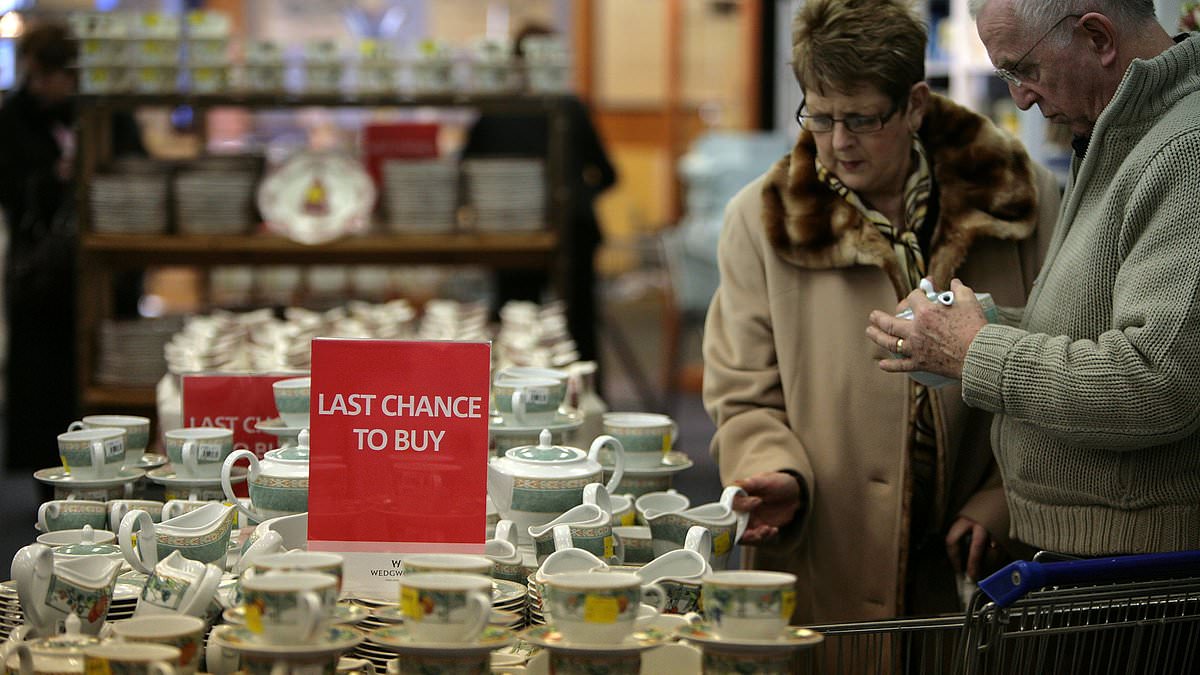What went wrong for Wedgwood? Once Britain’s most prestigious porcelain loved by the middle class – now you can’t even give the crockery away
By Editor,Ellen Coughlan
Copyright dailymail

What went wrong for Wedgwood? Once Britain’s most prestigious porcelain loved by the middle class – now you can’t even give the crockery away
What was once considered a status symbol, doesn’t hold the same value
Read more: Saved, treasures of Wedgwood: More than 80,000 artworks, ceramics and paintings from firm’s 250 year history secured
By ELLEN COUGHLAN, ENTERTAINMENT AND LIFESTYLE JOURNALIST
Published: 08:11 BST, 24 September 2025 | Updated: 08:14 BST, 24 September 2025
It once graced the tables of royalty, presidents and popes- for generations, Wedgwood was a symbol of refinement, tradition and impeccable taste.
But fast forward to today, and once-prized porcelain pieces that were lovingly gifted at weddings, and saved for anniversaries and Christmas dinners are gathering dust, or worse, going for pennies on online marketplaces.
The sparkle has well and truly faded for the formal dining crockery, pieces that once fetched hundreds of pounds are now struggling to sell at car boot sales, with some saying they can’t even ‘give the sets away’.
Founded in 1759 by the pioneering Josiah Wedgwood, the brand quickly rose to prominence, earning fans in high places. Its elegant, often hand-painted china was used in Buckingham Palace, the White House, the Vatican, and even the Kremlin.
However what was once considered a status symbol, doesn’t hold the same value in today’s society and in recent years Wedgwood has been in serious decline due to low demand and rising energy costs.
Last week, after seeing lower demand in key markets, Fiskars, the makers of Wedgwood, revealed plans to halt production at its Barlaston factory for up to 90 days starting September 29, with production expected to resume in early January 2026.
Expert and prolific author on ceramics and glass, John Sandon, who makes regular appearances on the BBC Antiques Roadshow, revealed the decline in demand for traditional porcelain is less about quality and more about shifting cultural attitudes.
He told the Daily Mail: ‘Most people consider their best china and family inherited crockery is ‘old fashioned’, whatever that means.
Once Britain’s most prestigious porcelain crockery that was once saved for special occasions is now worthless
‘Most old sets are regarded as impractical for everyday use, and very, very few people want to use them.’
Reflecting on changing attitudes toward inherited tableware, John noted the growing disconnect between sustainability messages and modern family preferences.
He added: ‘The much quoted ‘Antiques are Green’ message has tried to emphasise that old china sets are the ultimate recyclables. And Granny’s china sets should be used. But most modern families don’t want to.’
Highlighting the gap between appreciation and practicality, John pointed out that admiration for antique ceramics doesn’t always translate into everyday use.
‘Not using your old china tea services and fruit sets is nothing to do with the reason people choose plain white from Ikea and The Range instead of very expensive Wedgwood from John Lewis.
‘And thankfully collectable antique Wedgwood is just as wonderful as it’s always been. It mostly costs a lot less than it used to, which means great opportunity for those who still want to collect antiques. We love our antique ceramics- but we don’t use them.’
Meanwhile Pauline Kent, who’s father, Roy, was one of seven potters from Stoke-On-Trent, working for Wedgwood, revealed the British people have ‘fallen out of love with formality.’
Roy worked in the mould-making department and later retired to Norfolk at 65, passing away at 95. Meanwhile his brother Kenneth remained in the potteries until the age of 80.
Roy, who started working in Wedgwood at 14-years-old, also met Pauline’s mother Irene at the company, and they were married for almost 70 years.
The once-prized porcelain Wedgwood pieces that were lovingly gifted at weddings, and saved for anniversaries and Christmas dinners are now been discounted in shops
What was once considered a status symbol, doesn’t hold the same value in today’s society and in recent years Wedgwood has been in serious decline due to low demand and rising energy costs
Founded in 1759 by the pioneering Josiah Wedgwood, the brand quickly rose to prominence, earning fans in high places. Its elegant, often hand-painted china was used in Buckingham Palace , the White House , the Vatican, and even the Kremlin
Pauline said: ‘Apparently she spotted my dad in the mould making department and it was love at first sight.’
She shared that her late father, who passed away two years ago, had observed the decline in porcelain appeal over the years.
She said: ‘He started his working life at 14 working for Wedgwood. He died two years ago and left my brother and I lot of beautiful pottery, including Wedgwood, some I can’t even give away let alone sell.
‘We spoke many times about the demise of British pottery and changing taste.’
Pauline recalled her father explaining that ‘people no longer eat together, they eat in front of the TV and they eat a lot of takeaways so the occasion for beautiful China isn’t there.’
She added: ‘He also made the point that the British have embraced everything that’s casual – casual clothes, casual relationships, casual dining, casual ways of working.
‘We have fallen out of love with formality. Add to this our love affair with all things Scandinavian and French too and British pottery is undesirable.
‘I find it very sad but it won’t stop me from bringing out the Spode Christmas Tree collection at Christmas.’
A historic picture of the Wedgwood potteries in Stoke on Trent, Staffordshire
Meanwhile Pauline Kent, who’s father, Roy, (right) was one of seven potters from Stoke-On-Trent, working for Wedgwood, revealed the British people have ‘fallen out of love with formality’
Roy (right) worked in the mould-making department and later retired to Norfolk at 65, passing away at 95. Meanwhile his brother Kenneth (left) remained in the potteries until the age of 80
Roy, who started working in Wedgwood at 14-years-old, also met Pauline’s mother Irene (centre back row) at the company, and they were married for almost 70 years
In 2009, the collapse of the Waterford Wedgwood Royal Doulton group brought the company to the brink of closure, however Finnish firm Fiskars bought it in 2015, saving the brand.
It continued to produce its high-end, hand-painted and limited-edition pieces at its factory in Barlaston, Staffordshire, but after the company plunged into the red in 2023 with a £1.4 million loss.
Tom Hammersley, marketing manager at Staffordshire Chambers of Commerce, said he was concerned about the drop in demand, which came against a backdrop of increasing costs.
Speaking to BBC he said: ‘Wedgwood has huge global demand in areas including China and Japan. If that demand is slowing, and married with the increasing costs, it is a huge concern.’
Meanwhile Gareth Snell, MP for Stoke-on-Trent Central, described it as ‘incredibly worrying’ and said it further highlighted the need for support for the ceramics industry.
‘The support cannot be in some distant future or the promise of help tomorrow but real help today,’ he told the BBC.
However Wedgwood’s woes are not in isolation. Britain’s once-booming ceramics industry has been hit hard in recent years by soaring energy costs and changing tastes.
In February, Royal Stafford, a company with nearly 200 years of history, collapsed and eventually closed.
Despite the shift toward minimalist interiors and mass-produced tableware, there’s hope that the tide might one day turn
Crockery is pictured at the Waterford Wedgwood factory shop in Stoke-on-Trent, northwest England in 2009
In April, Moorcroft Pottery also went under, though it has since reopened, saved by the founder’s grandson.
For Pauline, whose family has deep roots in Stoke-on-Trent’s pottery industry, the decline of British ceramics is more than just economic, it’s deeply personal.
She explained: ‘It’s definitely sad that there isn’t the demand and distressing to know that Stoke-On-Trent will no longer be known as the Potteries where whole families worked together and developed the most incredible skills.
‘I will always be the person who turns a dish upside down to see where it’s been made and value a beautiful plate or candlestick or vase because I can appreciate the craftsmanship. It’s in my DNA.’
While many are downsizing or giving away their heirloom china, Pauline is holding on to it and passing it down.
She said: ‘Fortunately we have enough space to store most of my parents best pottery including soup tureens, huge serving plates and some Wedgwood cigarette lighters which they use for lighting candles.
‘I will definitely hold onto things although I have already started giving pieces to my children. It’s funny that they like the Mid-Century pieces which I’m not crazy about.’
Despite the shift toward minimalist interiors and mass-produced tableware, there’s hope that the tide might one day turn.
In 2009, the collapse of the Waterford Wedgwood Royal Doulton group brought the company to the brink of closure, however Finnish firm Fiskars bought it in 2015, saving the brand
Wedgwood continued to produce its high-end, hand-painted and limited-edition pieces at its factory in Barlaston, Staffordshire, but after the company plunged into the red in 2023 with a £1.4 million loss
Pauline added: ‘I hope we will fall in love with formality again. Life would be boring if we lived in leggings and only used white dishes.
‘As a family we love an excuse to dress up and this applies to having dinner together where we use a mixture of my parents Wedgwood, Emma Bridgewater and some Spode. Every piece comes from Stoke…of course it would.’
A spokesperson for Wedgwood told the Daily Mail Online: ‘On 29 September 2025, Fiskars Group will temporarily pause production at the Wedgwood factory in Barlaston, UK, for up to 90 days.
‘This short‑term measure is being taken to address elevated inventory levels caused by lower consumer demand in some of our key markets. A total of 70 employees will be placed on temporary leave.
‘The factory tours, part of the acclaimed World of Wedgwood tourist destination, will be suspended during this period, with plans to resume in early January 2026.
‘Barlaston and its community are of key importance to Fiskars Group and Wedgwood.
‘The site serves as a hub for our high-end and bespoke product, including handcrafted pieces in fine bone china and our signature Jasperware.
‘These pieces are brought to life by skilled artisans using techniques pioneered by Josiah Wedgwood – many still in use today.
‘This living tradition reflects our commitment to craftsmanship, the value of Made in England, and Barlaston’s enduring role in our heritage and operations.’
Share or comment on this article:
What went wrong for Wedgwood? Once Britain’s most prestigious porcelain loved by the middle class – now you can’t even give the crockery away
Add comment



